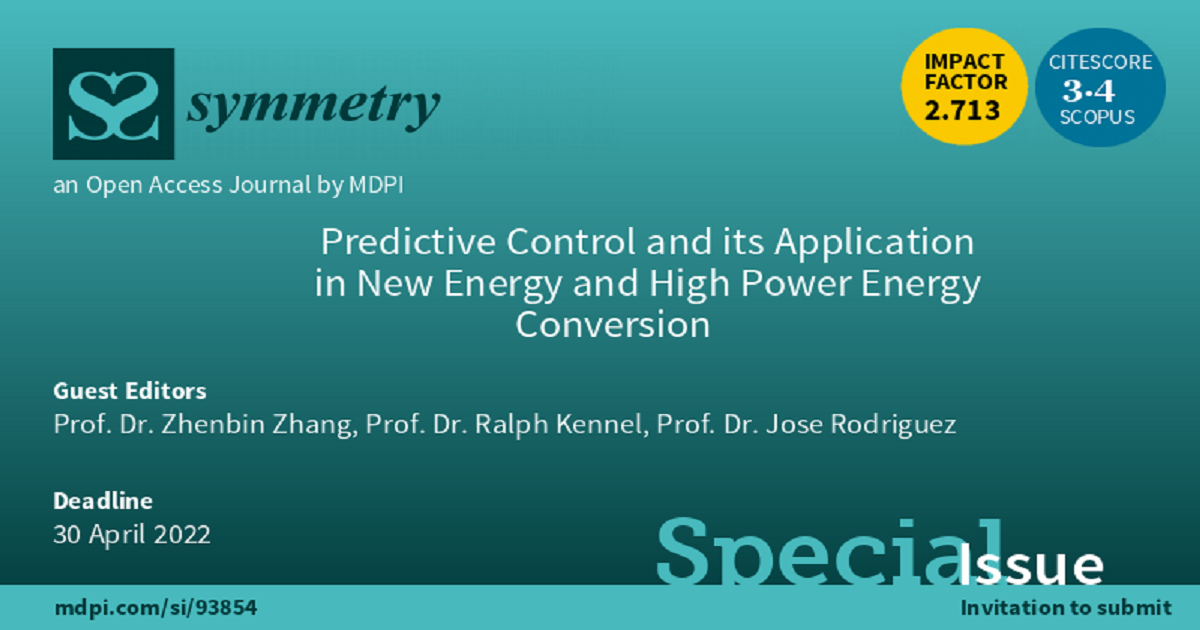- 2.2Impact Factor
- 5.3CiteScore
- 16 daysTime to First Decision
Predictive Control and Its Application in Renewable Energy and High Power Energy Conversion Systems
This special issue belongs to the section “Engineering and Materials“.
Special Issue Information
Dear Colleagues,
Model predictive control (MPC), also called receding horizon control, is an online optimal control technique that can easily tackle system constraints and nonlinearity. It uses a dynamic model to forecast system behavior and penalize a flexible cost function to produce the best control output. MPC has freedom to further improve the system control performance, since the “predicted behaviors” of the system are utilized within the control/decision process. MPC is an important and advanced control technique in renewable energy and high-power energy conversion, which can be implemented with modern microprocessors at a low cost, allowing them to solve the problems of difficult multivariable control. The use of predictive control offers a number of advantages, including a very intuitive approach, no need for modulators, and simple inclusion of nonlinearities and restrictions. MPC, an attractive alternative to linear control and modulation, is the current state-of-the-art research, as well as a popular subject for academic and industrial research.
The aim of this Special Issue is to provide a timely opportunity for scientists, researchers, and practicing engineers to share and disseminate their latest discoveries and results in the area of MPC applications and associated challenges of MPC in renewable energy and high-power energy conversion. Prospective authors are invited to submit original contributions, survey papers, or tutorials for review for publication in this Special Issue.
Predictive control is an optimization control technique, and due to the existence of symmetry in certain engineering systems, the resulting optimization problem possesses some form of symmetry. For example, in some constrained optimization problems, certain variables appear symmetrically in objective and constraint functions. Therefore, we also encourage scholars in related fields to contribute papers that employ symmetry or asymmetry concepts in the predictive control of renewable energy and high-power energy conversion systems. Topics of interest include but are not limited to:
- Predictive control for renewable energy and high-power energy conversion systems, e.g., photovoltaics, wind turbines, wave energy, utility-scale power electronics for the grid (FACTS, HVDC systems, UPS, etc.), energy storage, power quality conditioners;
- Industrial applications of MPC in high-power electronic systems, e.g., variable speed drive systems, electric vehicles, multilevel power converters;
- Data-driven (model-free) predictive control techniques in power electronic systems with a focus on industrial applications;
- Artificial intelligence in a predictive control frame in power conversion systems;
- (Advanced) predictive control for power systems, smart grids, and microgrids;
- Symmetry or asymmetry concepts in the predictive control of renewable energy and high-power energy conversion systems.
Prof. Dr. Zhenbin Zhang
Prof. Dr. Ralph Kennel
Prof. Dr. Jose Rodriguez
Guest Editors
Manuscript Submission Information
Manuscripts should be submitted online at www.mdpi.com by registering and logging in to this website. Once you are registered, click here to go to the submission form. Manuscripts can be submitted until the deadline. All submissions that pass pre-check are peer-reviewed. Accepted papers will be published continuously in the journal (as soon as accepted) and will be listed together on the special issue website. Research articles, review articles as well as short communications are invited. For planned papers, a title and short abstract (about 250 words) can be sent to the Editorial Office for assessment.
Submitted manuscripts should not have been published previously, nor be under consideration for publication elsewhere (except conference proceedings papers). All manuscripts are thoroughly refereed through a single-blind peer-review process. A guide for authors and other relevant information for submission of manuscripts is available on the Instructions for Authors page. Symmetry is an international peer-reviewed open access monthly journal published by MDPI.
Please visit the Instructions for Authors page before submitting a manuscript. The Article Processing Charge (APC) for publication in this open access journal is 2400 CHF (Swiss Francs). Submitted papers should be well formatted and use good English. Authors may use MDPI's English editing service prior to publication or during author revisions.
Keywords
- model predictive control
- renewable energy
- power conversion systems
- power electronics
- electrical drives
- power converters
- data-driven techniques
- artificial intelligence

Benefits of Publishing in a Special Issue
- Ease of navigation: Grouping papers by topic helps scholars navigate broad scope journals more efficiently.
- Greater discoverability: Special Issues support the reach and impact of scientific research. Articles in Special Issues are more discoverable and cited more frequently.
- Expansion of research network: Special Issues facilitate connections among authors, fostering scientific collaborations.
- External promotion: Articles in Special Issues are often promoted through the journal's social media, increasing their visibility.
- e-Book format: Special Issues with more than 10 articles can be published as dedicated e-books, ensuring wide and rapid dissemination.

